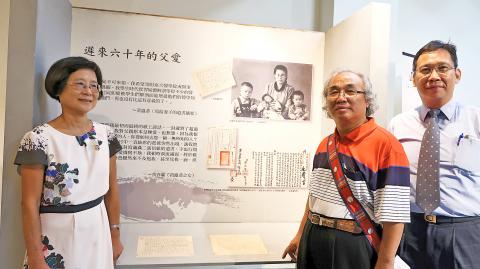Letters written by White Terror-era political prisoners to their families are on display in Pingtung.
The White Terror era refers to the suppression of political dissidents following the 228 Incident, an uprising that began on Feb. 27, 1947, which was brutally suppressed by the then-Chinese nationalist Party (KMT) regime, and the later imposition of martial law, which was not lifted until July 15, 1987.
During the White Terror, 140,000 to 200,000 people — many of whom were considered intellectual and social elites — were imprisoned and more than 1,000 were killed.

Photo: Lo Hsin-chen, Taipei Times
The exhibition, titled Belated Love: Farewell Letters of the Politically Persecuted in the White Terror Era (遲來的愛— 白色恐怖時期政治受難者遺書特展), has been put together by the Ministry of Culture and the Pingtung County Government.
It displays farewell letters from 10 victims of political persecution, including Huang Wen-kung (黃溫恭), Ho Chuan (何川), Huang Tien (黃天), Kao Yi-sheng (高一生), Huang Hsien-chung (黃賢忠), Wang Yao-hsun (王耀勳), Kuo Ching (郭慶), Tsai Tieh-cheng (蔡鐵城), Chen Chen-chi (陳振奇) and Chiu Hsing-sheng (邱興生).
“I was only five months old when my father [Huang Wen-kung] was arrested. I cried when I first read his farewell letter,” National Kaohsiung Marine University professor Huang Chun-lan (黃春蘭) said on Friday.
Huang Chun-lan said her father was born in Kaohsiung’s Lujhu District (路竹) and was the first dentist in the area.
After the 228 Incident, her family relocated to Pingtung’s Chunrih Township (春日), where he worked as the director of the township’s health center and improved hygienic conditions for Aboriginal communities and the survival rate of newborn infants, she said.
Huang Wen-kung wrote five farewell letters to his family before his execution in 1953, but they were only given to his family 58 years after his death, department director Wu Ching-fa (吳錦發) said.
“My dearest Chun-lan: While you are still in your mother’s womb, I have been arrested. How sorrowful it is that we cannot see each other in person. Nothing is more miserable than this,” one of the letters said.
It has been 30 years since the lifting of martial law, but most people have only a fragmented understanding of the time, Wu said.
The government is obliged to ensure historical justice for the families of the persecuted and to give the next generation access to the historical truth, she added.
The letters are valuable because they are the last confessions of the politically persecuted, who wrote them on the eve of their executions, Preparatory Office of the National Human Rights Museum editor and reviewer Tu Chien-feng (杜劍鋒) said.
Hopefully, through the letters, more people could learn how the persecuted died for their ideals, he added.
The exhibition is to run untill Oct. 15 at the county government’s Cultural Affairs Department.

Taiwan is stepping up plans to create self-sufficient supply chains for combat drones and increase foreign orders from the US to counter China’s numerical superiority, a defense official said on Saturday. Commenting on condition of anonymity, the official said the nation’s armed forces are in agreement with US Admiral Samuel Paparo’s assessment that Taiwan’s military must be prepared to turn the nation’s waters into a “hellscape” for the Chinese People’s Liberation Army (PLA). Paparo, the commander of the US Indo-Pacific Command, reiterated the concept during a Congressional hearing in Washington on Wednesday. He first coined the term in a security conference last

A magnitude 4.3 earthquake struck eastern Taiwan's Hualien County at 8:31am today, according to the Central Weather Administration (CWA). The epicenter of the temblor was located in Hualien County, about 70.3 kilometers south southwest of Hualien County Hall, at a depth of 23.2km, according to the administration. There were no immediate reports of damage resulting from the quake. The earthquake's intensity, which gauges the actual effect of a temblor, was highest in Taitung County, where it measured 3 on Taiwan's 7-tier intensity scale. The quake also measured an intensity of 2 in Hualien and Nantou counties, the CWA said.

The Overseas Community Affairs Council (OCAC) yesterday announced a fundraising campaign to support survivors of the magnitude 7.7 earthquake that struck Myanmar on March 28, with two prayer events scheduled in Taipei and Taichung later this week. “While initial rescue operations have concluded [in Myanmar], many survivors are now facing increasingly difficult living conditions,” OCAC Minister Hsu Chia-ching (徐佳青) told a news conference in Taipei. The fundraising campaign, which runs through May 31, is focused on supporting the reconstruction of damaged overseas compatriot schools, assisting students from Myanmar in Taiwan, and providing essential items, such as drinking water, food and medical supplies,

New Party Deputy Secretary-General You Chih-pin (游智彬) this morning went to the National Immigration Agency (NIA) to “turn himself in” after being notified that he had failed to provide proof of having renounced his Chinese household registration. He was one of more than 10,000 naturalized Taiwanese citizens from China who were informed by the NIA that their Taiwanese citizenship might be revoked if they fail to provide the proof in three months, people familiar with the matter said. You said he has proof that he had renounced his Chinese household registration and demanded the NIA provide proof that he still had Chinese